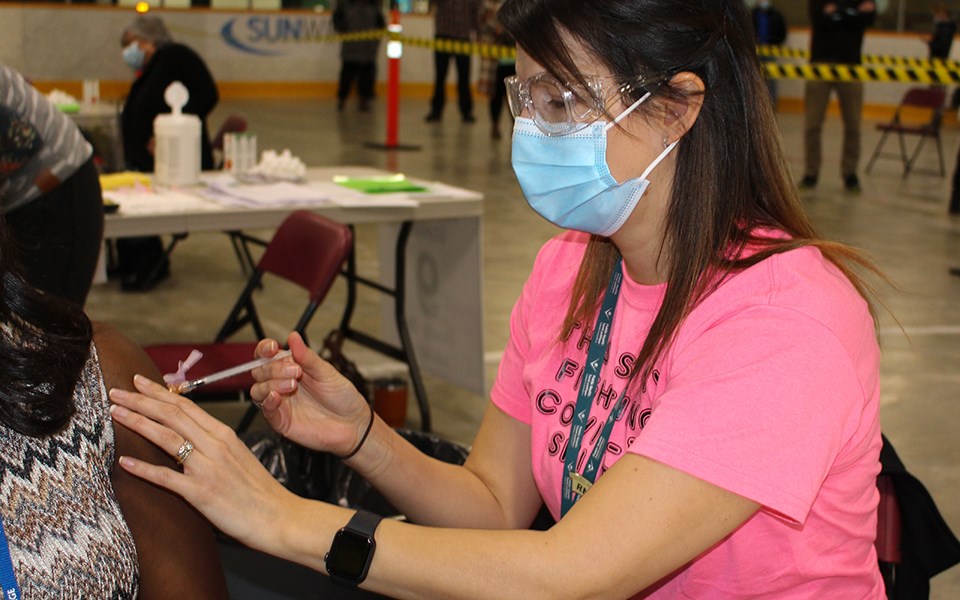The latest figures published by Public Health Sudbury and Districts (PHSD) show the region’s percentage for the first dose vaccine rate is higher locally at 31.7 per cent than both the provincial and national figures.
During a briefing call today with Dr. Theresa Tam, Canada’s chief medical officer of health, it was revealed that overall in Canada, 30 per cent of adults have received their first dose of vaccines, while the rate in Ontario was reported as 29.1 per cent.
The latest vaccination figures for this area (as of April 22) show that 62,316 people have received their first vaccine dose, while 7,175 people have been fully vaccinated.
In other COVID-19 news, Tam had some potentially good news for summer.
As Tam took media questions during the briefing, she remarked that health professionals are looking for the time period when 75 per cent of all Canadians have received their first dose of a vaccine and 20 per cent of Canadians have received their second dose, as the time when restrictions can be eased.
"It could be anywhere, you know, from mid-July to August kind of time frame," said Tam.
"But even then you have to be cautious and not just lift everything," she added. She said it is her preference to lift restrictions in stages and do things gradually.
Canada's chief public health officer said there is hope that tough pandemic restrictions could be eased by the middle of summer if enough Canadians have received their first and second doses of COVID-19 vaccines.
"If enough people get vaccinated and assuming vaccine rollout proceeds as planned by mid-summer at least 75 per cent of adults aged 18 years and older will have received the first dose and 20 per cent will have received the second dose, at this point restrictive measures could be gradually eased," said Tam.
She was speaking during a media technical briefing to provide updated COVID-19 information where she reported that hospital capacities and occupancy rates in Intensive Care Units (ICUs) are being challenged as more patients across Canada are contracting COVID-19 and are getting sicker.
Tam presented a PowerPoint presentation outlining several scenarios where as more Canadians get vaccinated the spread of the virus is slowed and hospitalizations are also brought back to more manageable levels.
"These models give us hope, illustrating that there is a safe way to lift most restrictive public health measures," said Tam.
She began the briefing however by declaring "trends have been discouraging in Canada in recent weeks."
"Elevated case counts and severe illness trends remind us we are still in a tight race between vaccines versus Variants and our actions matter," said Tam.
She reported that Canada's total number of COVID cases has exceeded 1.15 million which is an increase of more than 200,000 new cases since the last modelling update that was presented a month ago.
Tam said national disease and severity indicators have gone up "considerably" in the past month. She presented a graph showing the change in indicators which have spiked since mid-March.
"Average case counts are now more than double what they were a month ago with over 8,400 cases being reported daily, over the past week," said Tam.
"Likewise the average number of people in our hospitals and ICUs each day has doubled or more since late March," she added.
In the past week she said more than 4,000 Canadians were in hospitals each day. She said this included a daily rate of more than 1,200 patients in ICU care.
Tam added that the death count across Canada is lower than what was reported in the first and second wave, but there has been a recent spike of an average of 46 Canadians dying each day in the past week.
Tam also reported that the biggest increase in COVID hospital patients have been middle-aged Canadians.
"While hospitalizations are increasing across all adult age groups, the steepest rise in the average number of cases hospitalized with severe COVID-19 related illness is being observed among adults ages 40 to 59 years," she said.
"This is a reminder that although severe illness is less common in younger age groups, serious or prolonged illness can occur at any age," Tam added.
Tam also said health care professionals are expressing more concern about the growing incidence of the B.1.1.7 (U.K. Variant) among Canadian adults.
